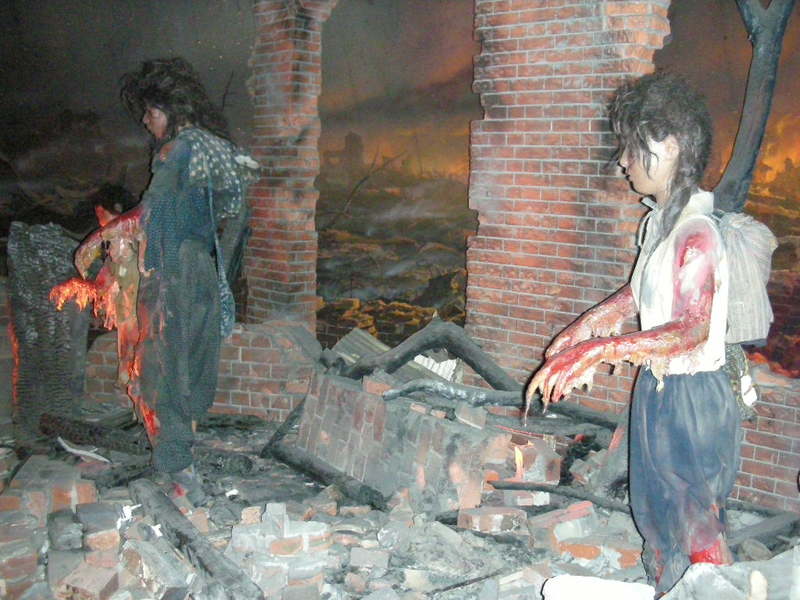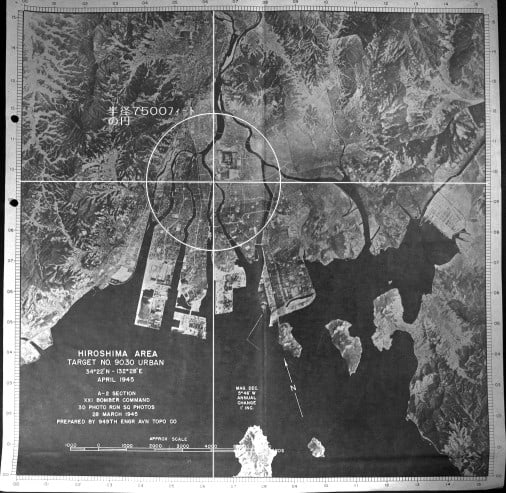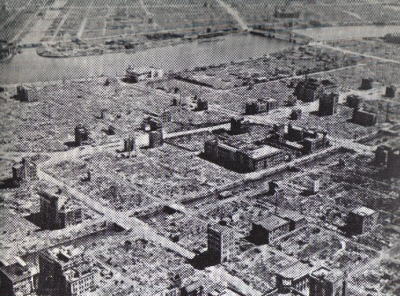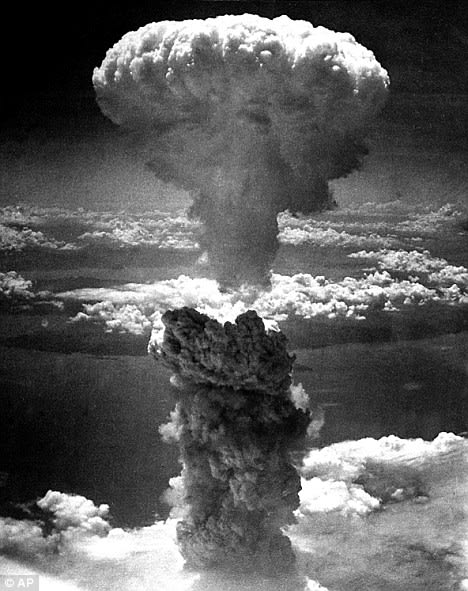国際政治は非道そのものである!!
表の紳士然とした顔と裏腹な
冷酷無悲な支配思想が垣間見える.......。
人道主義など取って付けた政治的道具にすぎない。裏では、真逆の残虐が平然と行われている。その残虐が残虐として認識されていないところに、人間の低劣な精神を垣間見せる。
人一人を殺すと、殺人罪だが、千人を殺すと英雄であるとは、古来有名な言葉であるが、それが今に生きている。この言葉が、亡霊のごとく生きている限り、精神の伸展はない。
アセンションが真に必要とされるところは、この精神的牢獄の解放にある。アセンション信奉者ではないが、この重い、鬱然とした精神性に捉えられている限り、真の平和など望めるべくもない。殆ど、偽善的産物の何モノでもない。
原爆投下に、歓喜して祝杯を挙げる、犠牲者が多ければ多いほどその効果を賛美する。殆ど、悪魔的発想である。しかし、これが現実なのだ。この現実を離れて、9.11自作自演テロも、自爆テロも、ガザのホロコーストも到底人間業とは容認出来はしないだろう。
テロリストが、残虐なのではない。テロリストを拡大生産している支配思想に取り憑かれた寡頭勢力が、現存する。今は、残存していると観た方が正確かも知れない。何とも寒々とした勢力であろうか?彼らの魂は、凍っている。
その勢力に媚びを売る支配願望の追随者も、又、魂は凍っている。上辺の栄華に酔った夢遊病者である。偽善の陶酔が、魂を凍らせている。アセンションとは、それを溶かす光のエネルギーだとすれば、誰しも待ちわびて当然だ。
しかし、安易な陶酔の麻薬をアセンションだと偽る、偽善も多い。警戒しなければならない。支配し、牢獄を広めることをアセンションとして、虎視眈々と偽りのセレモニーを計画している向きも少なくない。騙されてはならない。
『デーヴィッド・アイク(David Icke)の情報』さんのブログに、今は亡きユースタス・マリンズ氏の抄訳が掲載されたので、転載した。元記事は、長い。読了する価値はあるだろう。英語の達者な方はどうぞ。全文転載した。
【転載開始】2010年04月07日
ヒロシマ破 壊の理由(抄訳)
何故ヒロシマが破壊されたか-語られていないストーリー
■ パレスホテルの会合
1945年5月、戦後の方針を決めた人たち、もしくは彼らの言葉では"Masters of the Universe"(宇宙の主人たち)がサンフランシスコのパレスホテルに集まって国連憲章を起草していた。
主役の中の数名が閉じられた ガーデン・ルームにこもって、私的な会合を持った。
米国代表団の代表はこの秘密会合を一番の側近ののAlger Hiss(アルジャー・ヒスWIKI日本語)とともに訪れた。Hissは米大統領とソビエトのKGBの代理であった。John Foster Dulles(ジョン・フォスター・ダレス◆冷戦時代の有名な米国務長官(アイゼンハワー大統領政府の)。旧ソ連との対決に辣腕をふるう)はウオール・ス トリートの弁護士事務所Sullivan and Cromwellから来た。ダレスの先輩の William Nelson Cromwellは議会で「プロの革命家」と呼ばれていた。Averill Harriman(アヴェリル・ハリマン)臨時全権大使はモスクワでスターリンの生き残りのための戦争を2年間指揮していた。この4人の 男はアメリカ共和国の国際情勢での最高権力を代表していて、4人の中では国務長官のEdward Stettinius Jrだけが、米憲法によって認められた地位にあっただけだ。
ステティニアスが会議を開いたのは緊急事項を討議するためであった。
日本人が 既に非公式で講和を求めている。これは、重大な危機となる。
ここ数ヶ月のうちには原子爆弾が完成しないかも知れない。ステティニアスは「既 にドイツは無くなってしまった。もし日本が身を引いたら、爆弾を生きた人々でテストするための機会がなくなってしまうだろう」ヒ スが応えて、「しかし、長官殿、この兵器の恐ろしい力は誰もが無視するわけにはいかないでしょう」
ステティニアスは「いずれにせよ、われわれの戦 後計画はすべてが原爆で世界を恐れさせることにかかっているのです。」と言う。
ダレスは「この目的を達成するためには、沢山の数が必要でしょう。 百万くらいでしょうか。」
ステティニアスが応えて、「そうだ。日本で百万くらいの数を期待している。しかし、日本が降伏してしまったら、何も無く なってしまう」
「だったら、原爆が完成するまで奴らを戦争させておく必要があるね。それは問題ないだろう。無条件降伏がある」とダレス。
ス テティニアスは「奴らは無条件降伏に同意するはずがない。日本人は天皇を守ると誓わされている。」
ダレスは「そのとおり。あと3ヶ月日本を戦争状 態にしておこう。そうすれば爆弾を日本の複数の都市で使うことができる。この戦争を、世界中の人間すべてのむき出しの恐怖で終わらせる。そうすれば、誰も がわれわれの命令にひざまづくだろう。」■長崎の原爆資料館にはアインシュタインとオッペンハイマーの写真が目立つように飾られている。 また、アイゼンハワー将軍の書簡もある。
■Ronald W. Clark Einstein; His Life And Times
P.377 アインシュタインはシオニストたちとパレスチナのユダヤ人国のための運動を行う。P.460 アインシュタイン「ユダヤ人として、今日からはユダヤシオニスト活動の後援者となる(1919)」
1939年8月2日付けのアインシュタ インのルーズベルト大統領宛の手紙は、個人的に、10月11日にアレクサンダー・サックスによって大統領に渡された。
サックスはロシア系ユダヤ人 で「経済学者」であったが、実際はロスチャイルドの子分であった。サックスはホワイトハウスのルーズベルトに多額の金を届けていた。■Torrey Carrington ;Reflenctions of a Hiroshima Pilot
P.16 恐ろしい真実は、沖 縄攻撃のタイミングは8月初旬という原爆のタイムスケジュールに完全に関係したものであった。■Jack Rummel;Rovert Oppenheimer, Dark Prince
P.96 アメリカに戻ると、ヒロシマの爆撃のニュースは、安堵、プライド、喜び、ショック、悲しみの入り混じった感情で受け取られた。
オットー・フリシュ は喜びの叫びを覚えている。「ヒロシマが破壊されたぞ!」
「友人の多くがお祝いのためサンタフエのフオンダホテルのテーブルを予約するために電話 に殺到した。オッペンハイマーは『プロボクサーのように』歩き回り、頭上で手を合わせ拍手しながら演壇に登った」。【転載終了】
【元記事全文転載開始】

Why Hiroshima Was Destroyed
The Detailed History Of An Infamous Era
By Eustace C. Mullins
4-4-10- A very popular movie in Japan was Pride, The Fateful Moment, which shows Prime Minister General Hideki Tojo in a favorable light. With six others, he was hanged in 1968 as a war criminal. During his trial, his lawyers stated to the International Tribunal for the Far East, the Asian version of Nuremberg Trials, that Tojo's war crimes could not begin to approach the dropping of the atomic bombs on Hiroshima and Nagasaki. The prosecutors immediately objected, and censored their statements. That was the last time there was any official recognition of the atomic bomb massacres in Japan. Japanese officials have been effectively prevented from taking any stand on this matter because the American military occupation, which officially ended in 1952 with the Treaty with Japan, was quietly continued. Today, 49,000 American troops are still stationed in Japan, and there is no public discussion of the crimes of Hiroshima and Nagasaki.
Cast of Characters
The House of Rothschild; international bankers who made enormous profits during the nineteenth century, and used their money to take over governments.
Bernard Baruch: New York agent of the Rothschilds who at the turn of the century set up the tobacco trust, the copper trust and other trusts for the Rothschilds. He became the grey eminence of the United States atomic bomb program when his lackey, J. Robert Oppenheimner, became director of the Los Alamos bomb development, and when his Washington lackey, James F. Byrnes, advised Truman to drop the atomic bomb on Hiroshima and Nagasaki.
Albert Einstein; lifelong Zionist who initiated the United States' atomic bomb program with a personal letter to President Franklin D. Roosevelt in 1939.
The Secret History Of The Atomic Bomb
SUBTITLE Why Hiroshima Was Destroyed - The Untold Story
By Eustace C. Mullins
June 1998
The world was stunned to learn that India has now tested nuclear weapons. For many years, all nations have been concerned about the proliferation of atomic explosives. Even in their distress, no one seems to be interested in the historic or the psychological record of why these weapons were developed, and what special breed of mankind devoted themselves to this diabolical goal.
Despite the lack of public interest, the record is clear, and easily available to anyone who is interested. My interest in this subject, dormant for many years was suddenly rekindled during my annual lecture tour in Japan. My hosts had taken me to the city of Nagasaki for the first time. Without telling me their plans, they entered the Nagasaki Atomic Bomb Museum. I thought it would be an interesting experience, but, to my surprise, when I walked into the exhibition rooms, I was suddenly overcome by sadness. Realizing that I was about to burst into tears, I moved away from my companions, and stood biting my lip. Even so, it seemed impossible to control myself. I was surrounded by the most gruesome objects, the fingers of a human hand fused with glass, a photograph of the shadow of a man on a brick wall; the man had been vaporized in the explosion .
A NEW MISSION
When I returned to the United States, I knew1 had to unearth the sinister figures behind greatest of human catastrophes. It took many weeks of research to uncover what turned out to be the most far-reaching conspiracy of all time, the program of a few dedicated revolutionaries to seize control of the entire world, by inventing the powerful weapon ever unveiled.
The story begins in Germany. In the 1930s, Germany and Japan had a number of scientists icing on the development of nuclear fission. In both of these countries, their leaders sternly forbade them to continue their research. Adolf Hitler said he would never allow anyone in Germany to work to work on such an inhumane weapon.
The Emperor of Japan let his scientists know that he would never approve such a weapon. At that time the United States had no one working on nuclear fission. The disgruntled German scientists contacted friends in the United States, and were told that there was a possibility of government support for their work here. As Don Beyer tells these immigrants to the United States pushed their program.
"Leo Szilard, together with his long time friends and fellow Hungarian physicists, Eugene Wigner and Edward Teller, agreed that the President must be warned; fission bomb tehnology was not so farfetched. The Jewish emigres, now living in America, had personal experience of fascism in Europe. In 1939, the three physicists enlisted the support of Albert Einstein, letter dated August 2 signed by Einstein was delivered by Alexander Sachs to Franklin D. Roosevelt at the White House on October 11, 39."
CRIMINALS ON DISPLAY
At the Nagasaki Atomic Bomb Museum, photographs of two men are prominently displayed; Albert Einstein, and J. Robert Oppenheimer, who developed the atomic bomb at Los Alamos laboratories, New Mexico. Also on display is a statement from General Eisenhower, who was then supreme Military Commander, which is found in number of books about Eisenhower, and which can be found on p.426, Eisenhower by Stephen E. Ambrose, Simon & Shuster, NY, 1983.
"Secretary of War Henry L. Stimson first told Eisenhower of the bomb's existence. Eisenhower was engulfed by "a feeling of depression'. When Stimson said the United States proposed to use the bomb against Japan, Eisenhower voiced 'my grave misgivings, first on the basis of my belief that Japan was already defeated and that dropping the bomb was completely unnecessary, and secondly because I thought that our country should avoid shocking world opinion by the use (of atomic weapons).' Stimson was upset by Eisenhower's attitude 'almost angrily refuting the reasons I gave for my quick conclusion'. Three days later, Eisenhower flew to Berlin, where he met with Truman and his principal advisors. Again Eisenhower recommended against using the bomb, and again was ignored.
Other books on Eisenhower state that he endangered his career by his protests against the bomb, which the conspirators in the highest level of the United States government had already sworn to use against Japan, regardless of any military developments. Eisenhower could not have known that Stimson was a prominent member of Skull and Bones at Yale, the Brotherhood of Death, founded by the Russell Trust in 1848 as a bunch of the German Illuminati, or that they had played prominent roles in organizing wars and revolutions since that time. Nor could he have known that President Truman had only had one job in his career, as a Masonic organizer for the State of Missouri, and that the lodges he built up later sent him to the United States Senate and then to the presidency.
ATOMIC TERRORISM
The man who set all this in motion was Albert Einstein, who left Europe and came to the United States in October 1933. His wife said that he "regarded human beings with detestation". He had previously corresponded with Sigmund Freud about his projects of "peace" and "disarmament", although Freud later said he did not believe that Einstein ever accepted any of his theories. Einstein had a personal interest in Freud's work because his son Eduard spent his life in mental institutions, undergoing both insulin therapy and electroshock treatment, none of which produced any change in his condition.
When Einstien arrived in the United States, he was feted as a famous scientist, and was invited to the White House by President and Mrs. Roosevelt. He was soon deeply involved with Eleanor Roosevelt in her many leftwing causes, in which Einstein heartily concurred. Some of Einstein's biographers hail the modern era as "the Einstein Revolution" and "the Age of Einstein", possibly because he set in motion the program of nuclear fission in the United States. His letter to Roosevelt requesting that the government inaugurate an atomic bomb program was obviously stirred by his lifelong commitment to "peace and disarmament". His actual commitment was to Zionism; Ronald W. Clark mentions in Einstein; His Life And Times, Avon, 1971, p.377, "He would campaign with the Zionists for a Jewish homeland in Palestine." On p.460, Clark quotes Einstein, "As a Jew I am from today a supporter of the Jewish Zionist efforts." (1919) Einstein's letter to Roosevelt, dated august 2, 1939, was delivered personally to President Roosevelt by Alexander Sachs on October 11. Why did Einstein enlist an intermediary to bring this letter to Roosevelt, with whom he was on friendly terms? The atomic bomb program could not be launched without the necessary Wall Street sponsorship. Sachs, a Russian Jew, listed his profession as "economist" but was actually a bagman for the Rothschilds, who regularly delivered large sums of cash to Roosevelt in the White House. Sachs was an advisor to Eugene Meyer of the Lazard Freres International Banking House, and also with Lehman Brothers, another well known banker. Sachs' delivery of the Einstein letter to the White House let Roosevelt know that the Rothschilds approved of the project and wished him to go full speed ahead.
A UNITED NATIONS PROJECT
In May of 1945, the architects of postwar strategy, or, as they liked to call themselves, the "Masters of the Universe", gathered in San Francisco at the plush Palace Hotel to write the Charter for the United Nations. Several of the principals retired for a private meeting in the exclusive Garden Room. The head of the United States delegation had called this secret meeting with his top aide, Alger Hiss, representing the president of the United States and the Soviet KGB; John Foster Dulles, of the Wall Street law firm of Sullivan and Cromwell, whose mentor, William Nelson Cromwell, had been called a "professional revolutionary" on the floor of Congress; and W. Averill Harriman, plenipotentiary extraordinary, who had spent the last two years in Moscow directing Stalin's war for survival. These four men represented the awesome power of the American Republic in world affairs, yet of the four, only Secretary of State Edward Stettinius Jr., had a position authorized by the Constitution. Stettinius called the meeting to order to discuss an urgent matter; the Japanese were already privately suing for peace, which presented a grave crisis. The atomic bomb would not be ready for several more months. "We have already lost Germany," Stettinius said. "If Japan bows out, we will not have a live population on which to test the bomb."
"But, Mr. Secretary," said Alger Hiss, "no one can ignore the terrible power of this weapon." "Nevertheless," said Stettinius, "our entire postwar program depends on terrifying the world with the atomic bomb." "To accomplish that goal," said John Foster Dulles, "you will need a very good tally. I should say a million." "Yes," replied Stettinius, "we are hoping for a million tally in Japan. But if they surrender, we won't have anything." "Then you have to keep them in the war until the bomb is ready," said John Foster Dulles. "That is no problem. Unconditional surrender." "They won't agree to that," said Stettinius. "They are sworn to protect the Emperor." "Exactly," said John Foster Dulles. "Keep Japan in the war another three months, and we can use the bomb on their cities; we will end this war with the naked fear of all the peoples of the world, who will then bow to our will."
Edward Stettinius Jr. was the son of a J.P. Morgan partner who had been the world's largest munitions dealer in the First World War. He had been named by J.P. Morgan to oversee all purchases of munitions by both France and England in the United States throug













